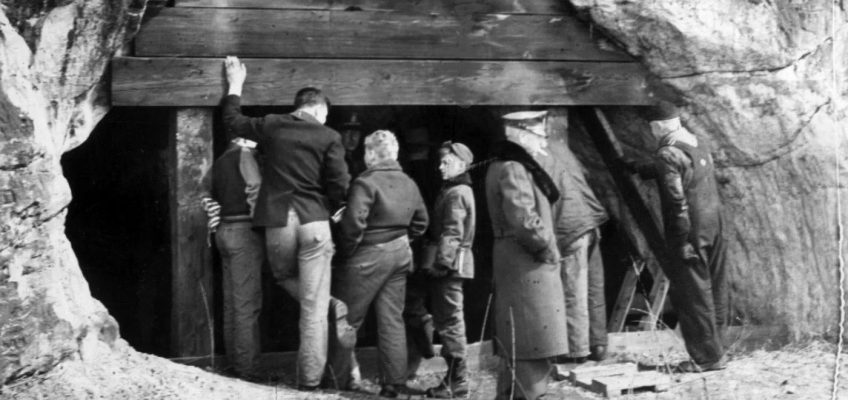St. Paul police received an unusual phone call one Saturday morning in March 1950.
A pair of Dayton’s Bluff boys swore that one of the FBI’s “10 Most Wanted Fugitives” was living in a cave below Indian Mounds Regional Park.
Fourteen-year-old James Lewis had recognized a photo in the St. Paul Dispatch of convicted killer William Raymond Nesbit, who he knew only as “Ray.” Nesbit had been on the lam since he escaped a South Dakota prison in 1946.
Lewis was sure the cave-dwelling hermit he and his friends often visited on their way home from school was the 50-year-old fugitive sought by the feds.
“We were suspicious of him right from the start,” one of the boys later told the Pioneer Press.
Lewis showed the Dispatch photo to his friend, 13-year-old James Radeck, and the youngsters resolved to turn Ray into the police.
When two skeptical officers knocked on a makeshift door over the cave’s entrance, Nesbit obligingly emerged and was taken into custody.
Lewis and Radeck, hailed as heroes by law enforcement officials and the local news media, were awarded $100 and sent by the Pioneer Press and Dispatch on an all-expenses-paid trip to Washington, D.C., where they toured FBI headquarters and met the Bureau’s director, J. Edgar Hoover.
“You’ve done your nation a great service,” Hoover told the boys. “Nesbit was one of our most desperate criminals. I’m proud to know such good citizens as you. What you’ve done has set an example which adults can well emulate.”
Phony heist turns to murder
Nesbit’s criminal career had ended with a bang on New Year’s Eve 1936.
William Raymond Nesbit escaped from a South Dakota prison in 1946. No. 3 on the FBI’s “10 Most Wanted Fugitives” list, he was found living in a St. Paul cave in March 1950. (Pioneer Press File Photo)
Working as a bartender in Sioux City, Iowa, he had been enlisted by a local jeweler that December to help stage a heist in the man’s downtown office for an insurance payout. Nesbit and a handful of other hired thieves blew open the jeweler’s safe with explosives to make it appear a small fortune in precious gems had been stolen.
The gang was paid $1,000 for their efforts before fleeing north to Sioux Falls, S.D., where they broke into the explosives warehouse of a hardware store outside town on Jan. 31. When a fight broke out among the thieves, Nesbit and two other members of the crew shot Floyd Parker and his girlfriend, Helen Sieler.
As they left the warehouse, Nesbit and the other men lit a fuse on an explosive charge inside the building. The resulting blast was felt for 50 miles. Parker was vaporized by the explosion, but Sieler somehow survived to testify against Nesbit and Parker’s other killers.
Nesbit was initially sentenced to life in prison, but that was later reduced to 20 years. When he escaped from the South Dakota State Penitentiary in September 1946, he had just three months left to serve before being paroled.
‘Boy sleuths bring arrest of fugitive’
Nesbit had been on the run for more than three years by the time Lewis and Radeck discovered him living in the cave below Mounds Park in December 1949.
Believing he was just a good-natured hobo, the boys and a few of their friends began stopping by Nesbit’s cave regularly on their way home from school. They even brought him canned food and other household items donated by their parents.
They did have their suspicions, though. Nesbit introduced himself only as “Ray” — refusing to give his last name — and he was cagey about his background.
When the FBI launched its 10 Most Wanted list on March 14, 1950, the St. Paul Dispatch began publishing photos of the fugitives. Nesbit’s mugshot ran on page 11 of the March 16 issue, where it was spotted by Lewis.
He showed the photo to Radeck the next day. They decided to round up a few of their friends the following morning and take the clipping down to the cave for an in-person comparison.
When the boys arrived at the cave about 8:30 a.m., they saw smoke coming out of the chimney. They packed the flue with snow, forcing Nesbit out of his smoke-filled hovel. Satisfied that they had the right man, they used the phone at a nearby bar to alert the police.
“Boy sleuths bring arrest of fugitive,” a Pioneer Press headline cheered the next day.
‘He was friendly as can be’
Within a few days of Nesbit’s capture, he was on his way back to South Dakota to serve the remainder of his sentence, and Lewis and Radeck were on their way to Washington.
St. Paul police and the American Legion recognize local youths for aiding officers in apprehending suspects and saving lives in April 1950. James Lewis, 14, on the far left in the back row, and James Radeck, 13, on the far left in the front row, were honored for their role in the capture of William Raymond Nesbit a month earlier. (Buzz Magnuson / Pioneer Press)
The boys received commendations from the police department and local civic organizations. Their exploits were even turned into a radio play by CBS for its “Gangbusters” show.
But not everyone was convinced Lewis and Radeck did the right thing. Their pal Bob Holmberg, who often visited Nesbit’s cave with them, later said he “wouldn’t talk to them for a long time because they’d turned in a friend.”
“He was friendly as can be,” Holmberg said of Nesbit in a 1999 interview with Pioneer Press columnist Don Boxmeyer, “and if we didn’t have cigarettes of our own, he’d always have some Bull Durham and papers.”
The grandmother of another boy who had visited Nesbit said the fugitive once saved the life of a child who fell into the Mississippi River near his cave, dragging him out of the water and administering CPR.
When the Dispatch caught up with Nesbit nearly 13 years after his capture, he had been paroled to St. Paul and was working as a custodian for a local business.
The profile — headlined “Dynamite-killer now leads quiet life” — described the aging Nesbit as a “gentle figure” living alone in a modest apartment:
“His days are spent watching television, going to movies, fishing, taking his car out for a drive and looking forward to his 65th birthday, when he can retire and settle down to a comfortable old age.”
Related Articles
Sign up for From the Archives, our weekly St. Paul history newsletter
How the COVID-19 pandemic shut down Minnesota in three weeks
Photo gallery: Throwback Thursday
Museum offers new home to gun St. Paulites used to fire first American shots of WWII
How a brazen murder in downtown St. Paul upended the city’s liquor trade 100 years ago



